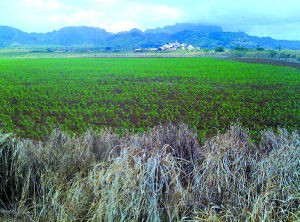01
Dec
European Court Decision Rules in Favor of Increased Pesticide Transparency
(Beyond Pesticides, December 1, 2016) A groundbreaking decision by the European Court of Justice (ECJ) last Wednesday ruled in favor of the environmental nongovernmental organizations (NGOs), Pesticide Action Network Europe (PAN Europe) and Greenpeace Nederland, which had been denied access to industry studies and other information submitted by chemical companies to European regulators on the controversial weedkiller glyphosate and the bee-toxic insecticide imidacloprid. In the two judgments regarding public access to underlying environmental effects information on chemicals, ECJ clarified the meaning of “emissions into the environment” and “information on [or which relates to] emissions into the environment” within the EU regulation.
The Court found that “emissions into the environment” includes releases from pesticide products or active ingredients contained in these products, as long as the release is possible under realistic conditions of use of this product. It interpreted the “information on emissions into the environment” to cover information relating to the nature, composition, and quantity of those emissions, but also “information enabling the public to check whether the assessment [is correct], as well as the data relating to the medium or long-term effects of those emissions.” This decision will allow for any interested party to obtain industry studies and underlying data that were submitted to European regulatory agencies for pesticide review and approval.
This ruling resulted from two similar cases, one in the European Commission and the other a court in the Netherlands, that refused to give environmental NGOs access to industry studies and other documents. According to Politico, one case dealt with access to a documents request from PAN Europe and Greenpeace for “internal studies linked to the safety of the controversial weedkiller glyphosate.” Glyphosate, produced by Monsanto, is one of the most popular weedkillers in the U.S., and the active ingredient in Roundup. Glyphosate is often promoted by industry as a “low toxicity” chemical and “safer” than other chemicals, yet has been shown to have detrimental impacts on humans and the environment. Given its widespread use on residential and agricultural sites, its toxicity is of increasing concern.
The other case was a request by the Dutch bee organization, Stichting de Bijenstichting, for information on the authorization process of the neonicotinoid imidacloprid. The use of imidacloprid has gained popularity in agricultural and residential settings, but its human and environmental effects still have not been fully evaluated, despite its registration over 20 years ago. While many in the industry consider imidacloprid to be a pesticide of relatively low toxicity, it has been found to be extremely toxic to non-target insects like bees, and has led to resistance in the Colorado potato beetle. Advocates are urging U.S. Environmental Protection Agency (EPA) to complete its full assessment of imidacloprid and follow Canada’s lead in eliminating this toxic chemical.
There are some concerns regarding the specific types of documents ECJ deemed suitable for release to the public, since the court stated that “the concept of information on emissions into the environment does not include information relating to purely hypothetical emissions.” This may ultimately mean that authorities can still deny access to certain documents that do not specifically include data on exposure to humans.
This is a huge win for environmental organizations that have long been critical of the lack of transparency in the government review process of pesticides. And while it does not apply to regulatory decisions in the U.S., it sets a legal precedent going forward. The pesticide industry is concerned about this ruling and claim that reduced confidentiality may affect investment in the market. According to the European Chemical Industry Council, the rulings “set a potentially dangerous precedent for the protection of confidential business information submitted by companies for EU substance and product registrations and approvals.”
At the domestic level, Beyond Pesticides fights for the future of the planet, by supporting and advocating for organic land management, holding federal agencies accountable to their statutory responsibility, and engaging with local communities to pass progressive pesticide initiatives that are protective of environmental and public health. For more information on what you can do, visit our Action Alerts sign-up page, read about Tools for Change to use in your local community, and consider becoming a member today.
Sources: Politico, Energydesk
All unattributed positions and opinions in this piece are those of Beyond Pesticides.










